 In times past, it is said man had a much longer lifespan than the 80 - 90 years we now consider to be the norm. Yet, in certain parts of the world, there are still people who reach the age of one hundred and older. Do they have the key to longevity? And if they do, what is it exactly? What do they know, or what do they do, that the average man on the street is clueless about? The key to their longevity may simply be a much more heightened immune system!
In times past, it is said man had a much longer lifespan than the 80 - 90 years we now consider to be the norm. Yet, in certain parts of the world, there are still people who reach the age of one hundred and older. Do they have the key to longevity? And if they do, what is it exactly? What do they know, or what do they do, that the average man on the street is clueless about? The key to their longevity may simply be a much more heightened immune system!
The world has long had and dealt with parasites. Some of these are so small that they exist at the cellular level. They are everywhere. They are even on the skin, in the blood, and the organs of every single living animal on the planet, humans included.
As a countermeasure, we, as well as all living animals, have developed a way of dealing with them. This is by means of our immune system. Interestingly, our immune system itself evolved from parasites in a bid to remove harmful intruders so that those that were more beneficial could survive, i.e. those that could live in harmony with each other and living tissue. In essence, our immune system thus preys on parasites it deems harmful.
Now, upon learning that we are infested with parasites, the first instinctive reaction would be to get rid of them. This would be a short-term solution, and also a disastrous one. The problem is there are three distinctly different types of parasites, but the ones we need are key in ensuring longevity, as will be explained.
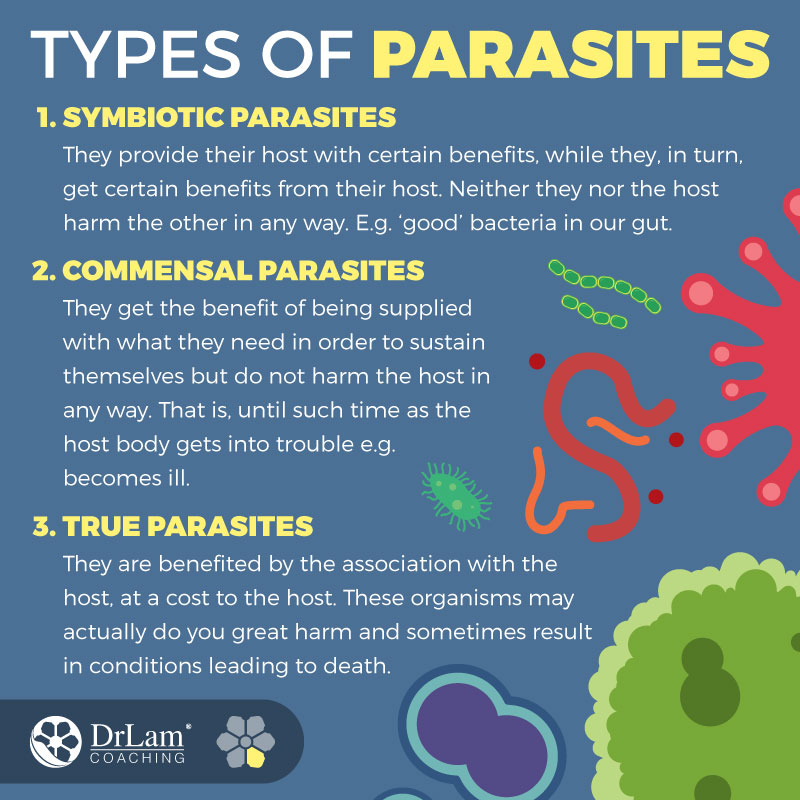
The first type of parasites live in symbiosis with their carrier. They provide their host with certain benefits, while they, in turn, get certain benefits from their host. Neither they nor the host harm the other in any way. One such type of parasite is the ‘good’ bacteria found in our gut, for instance. They provide a beneficial service as far as digestion is concerned, while we provide them with the nutrients they need.
The second type we have what is known as commensalism. Here these organisms are in the host body. They get the benefit of being supplied with what they need in order to sustain themselves but do not harm the host in any way. That is, until such time as the host body gets into trouble e.g. becomes ill. They may actually then contribute towards the illness and are no longer as innocent as they might have seemed.
Lastly, there are the true parasites that are benefited by the association with the host, at a cost to the host. These organisms may actually do you great harm and sometimes result in conditions leading to death.
When commonly talking about parasites in people we usually tend to think of tapeworms, for example. However, the parasites we will continually be referring to might be microbial in size, as previously mentioned. Tapeworms, as a matter of interest, have their own set of parasites.
 Our immune system is our greatest key to longevity. In fact, our immune system saves our lives without us even being aware of it. Our immune system and immune cells play a role in just about every bodily function, for example:
Our immune system is our greatest key to longevity. In fact, our immune system saves our lives without us even being aware of it. Our immune system and immune cells play a role in just about every bodily function, for example:
These immune cells were designed by natural evolution, with the main function of sustaining life in a parasitic environment. This parasitic environment encompasses the entire biosphere on which we live. In other words, they were designed in order to ensure our survival on earth.
If the immune system is so strong, however, and if it is the key to longevity, why do some people live relatively short lives, while others live much longer?
If you want to understand why some people on earth live much longer lives than others, you need to study them. What are their habits? Where do they live? What do they eat?
One such group of people live in the Himalaya Mountains, which is one of the harshest terrains in the world. In many cases, the old adage of ‘survival of the fittest’ applies. Yet even within the Himalayas, there are certain groups in certain areas who live to a much more advanced age than others. This too needs looking into.
The Himalayas have a very harsh, cold climate. Studies indicate, that colder temperatures encourage better circulation. It also improves the skin barrier, i.e. the outer layer of skin, resulting in less infection or microbes from entering the body.
Additionally, people in this type of harsh, cold climate show an increase in their immune cells, meaning their bodies are better able to fight off the onslaught of ‘bad’ organisms. Colder temperatures is another key to longevity that results in an increased production of sex hormones, which results in improved fertility, and in a sense, improves mood.
Research with regards to colder temperatures has also produced a number of surprising results. When doing experiments on cold water exposure, they found that the body, under extremely cold conditions, has sustained elevated levels of stress-fighting hormones, creates more active cancer-fighting cells, and releases more endorphins (feel good hormones).
 Besides temperature, earth radiation is also a factor. The areas where those with a high incidence of longevity reside also have soil with an extremely high crystalline mineral content. These crystals give off intense earth radiation, also known as a geomagnetic field.
Besides temperature, earth radiation is also a factor. The areas where those with a high incidence of longevity reside also have soil with an extremely high crystalline mineral content. These crystals give off intense earth radiation, also known as a geomagnetic field.
What has been found is that those people living in the areas of the Himalayan mountains with the most intense earth radiation, tend to have longer life expectancies than their counterparts living in areas with less.
Modern science has created machines that simulate this effect. The treatment offered by these machines is known as pulsed electromagnetic field (PEMF) therapy and the results have been telling. Some of the results obtained by use of PEMF generating machines include:
Pulsed magnetic therapy has also shown other benefits, including
Although not everyone is suited to living in those parts of the Himalayas where temperatures are much colder and where there is more earth radiation, similar effects can be experienced by taking a cold shower on a regular basis and by means of pulsed magnetic therapy. Be cautious when using PEMF if you are sensitive or have a heart conditions, the electrical pulses, while mild, can stimulate your body and lead to adverse effects.
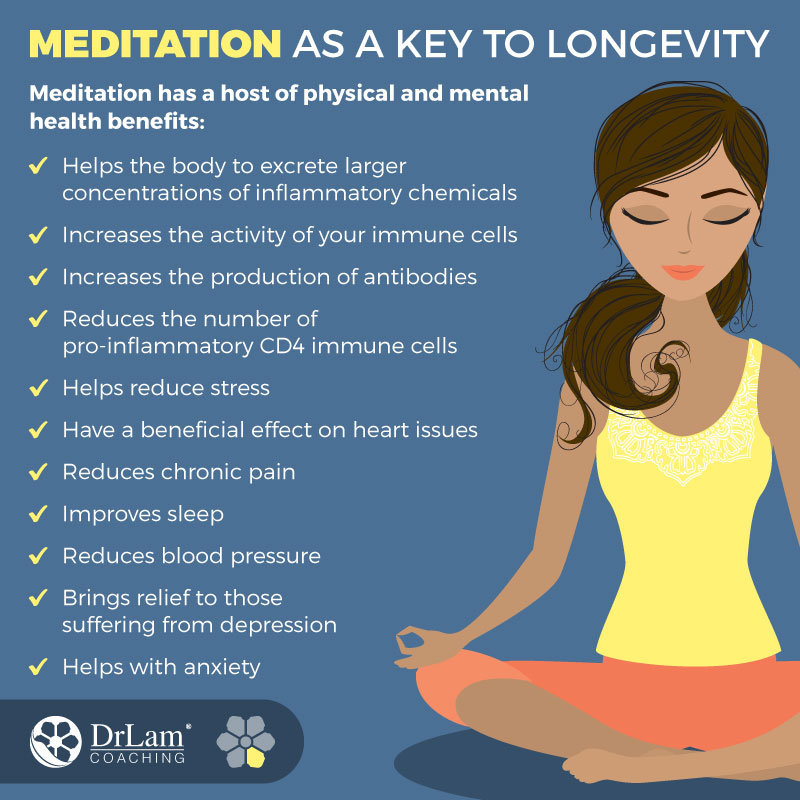
Meditation can be seen as a process of contemplation, thinking, pondering, considering, reflecting and praying. In essence, the mind is transformed, and the way in which you see things changes. In doing so, you develop clarity, a feeling of calmness, and of being in the present. The result is a deep peace and a more positive outlook on things in general and life in particular.
Meditation has a host of physical and mental health benefits:
 Pro-inflammatory CD4 cells play an important role in protecting the intestinal lining against foreign invaders. When compromised, pathogens can enter the bloodstream via the intestinal lining, resulting in leaky gut, also known as irritable bowel syndrome or IBS.
Pro-inflammatory CD4 cells play an important role in protecting the intestinal lining against foreign invaders. When compromised, pathogens can enter the bloodstream via the intestinal lining, resulting in leaky gut, also known as irritable bowel syndrome or IBS.
Meditation may also:
One of the keys to longevity is exercise. Not any exercise will do, however. Research has found that those who have a severely strenuous exercise regime have a similar life expectancy as those who lead a sedentary lifestyle.
Seemingly, this indicates the key to a long life is moderation. It seems that those who practice moderate forms of exercise, such as, for example, yoga, brisk walking, tai chi, or any other form of aerobic activity that allows you to break out in a slight sweat and lets your heart increase its pace slightly is of more benefit than strenuous running or exercise with a similar effect on the body.
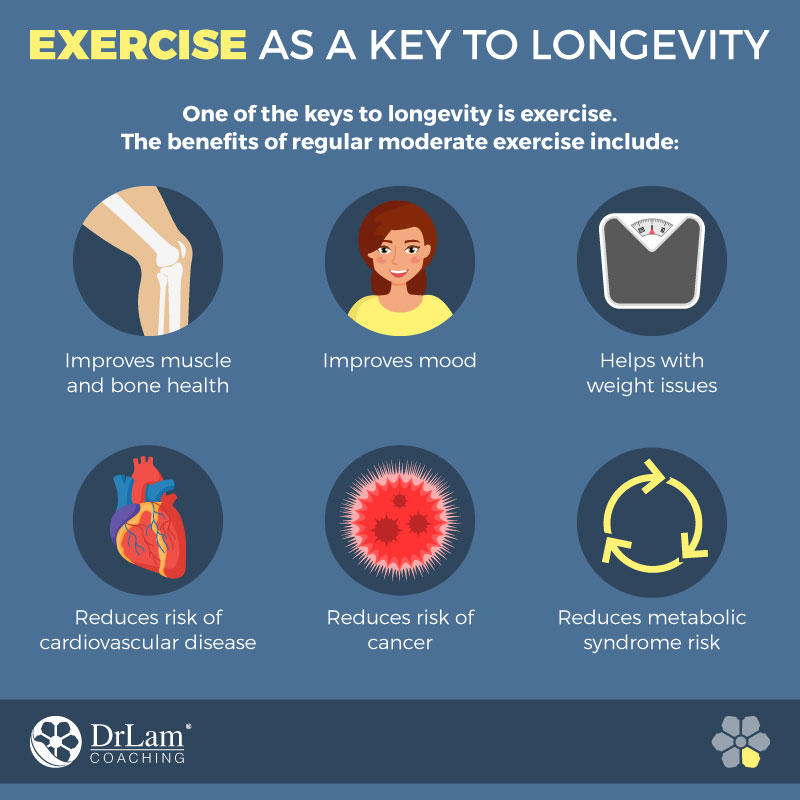
The benefits of regular moderate exercise include:
Research indicates that regular physical activity builds muscles and prevents the loss of bone density related to age. It also keeps your joints healthy and improves mobility in those with arthritis.
Regular, moderate exercise, besides being healthy for your body, also has the added advantage of releasing ‘feel good’ hormones in the brain, thereby helping maintain your mental health.
Physical activity burns calories and may help in the losing and maintaining of weight.
Research indicates a lower incidence of cardiovascular disease in those who take part in frequent, moderate exercise. It may also deal with high blood pressure issues.
Research shows that when those with metabolic syndrome increase their exercise activity, they lower the risk of metabolic syndrome (high blood pressure, low levels of good cholesterol, high blood sugar levels, and too much fat around the waist). Regular exercise also plays a role in controlling blood sugar levels.
Research indicates that people who regularly partake in exercise tend to stand a lower risk of contracting certain types of cancers, such as colon, breast, and lung cancer.
There are also indications that cancer survivors have a better quality of life when they become more active.
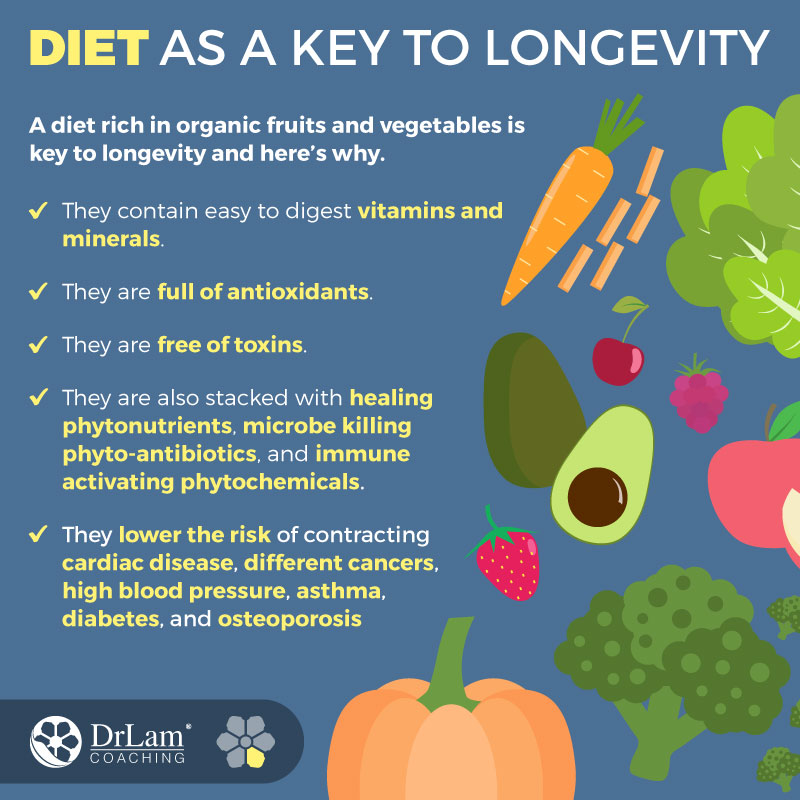
 Studies indicate that vegetarians with a diet rich in organic vegetables have double the cancer cell destroying ability than non-vegetarians. The question is, why?
Studies indicate that vegetarians with a diet rich in organic vegetables have double the cancer cell destroying ability than non-vegetarians. The question is, why?
The vitamins and minerals in fruit and vegetables are very easy to digest while they are full of antioxidants. Organic fruit and vegetables, while being free of the toxins those of us ingest by eating ‘regular’ produce, are also stacked with healing phytonutrients, microbe killing phyto-antibiotics, and immune activating phytochemicals. In short, they are a key to longevity that is conducive to good overall health.
The benefits associated with an organic vegetarian diet are many, including lowering your risk of the contracting or developing:
 Balanced hormones are not only essential for your general health and well-being but may also play a role in the key to longevity. When there is a hormone imbalance, such as is associated with the sex hormones, i.e. testosterone and estrogen, aging is fast-tracked.
Balanced hormones are not only essential for your general health and well-being but may also play a role in the key to longevity. When there is a hormone imbalance, such as is associated with the sex hormones, i.e. testosterone and estrogen, aging is fast-tracked.
There are many reasons for a hormonal imbalance, such as premenstrual syndrome (PMS), menopause, pregnancy, lifestyle factors such as too little sleep, being overweight, or not enough exercise, thyroid issues, and even diabetes, among others. The medical profession often uses hormone replacement therapy to assist with the symptoms experienced as a result of hormonal imbalances.
There are many different symptoms to look out for if you think your hormones are out of whack. Some of the most common symptoms of an imbalance in your hormones are:
Modern medicine, frequently, addresses these symptoms by means of hormone replacement therapy. Although this most certainly has its time and place, it does not address the underlying root cause of the problem. Holistic medicine has found that, quite often, addressing the cause of the problem instead of the symptoms has a longer lasting result when it comes to managing the condition.
Traditionally, certain herbs have proved beneficial in not only stabilizing hormones but in strengthening the immune system as well; both are important factors for increased longevity in the long run.
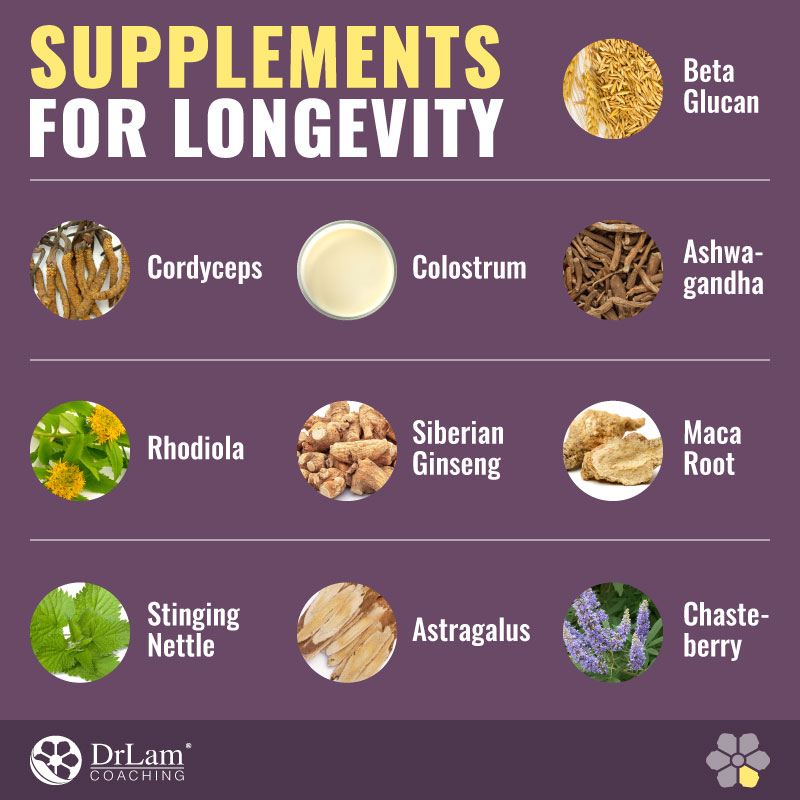
Beta glucans are specific sugars that act as immunomodulators. This means that it is able to raise your immune system’s response to any pathogens, e.g. cancer cells, for example. This key to longevity is commonly found in the cell walls of certain fungi, plants (e.g. barley and oats), algae, yeasts, bacteria, and lichen.
Whereas many supplements may stimulate your immune system to fight off any negative stimulus, they can often over-stimulate the immune system, leading to a set of negative consequences. Beta glucans, on the other hand, while stimulating your system, are not able to overstimulate it. They are thus a safe supplement.
Beta glucans are effective against a variety of conditions, including colds and flu, allergies, skin conditions (such as eczema and dermatitis), chronic fatigue syndrome, diabetes, cancer, high cholesterol, and a host of others.
When considering dosage, however, it is best to consult a healthcare practitioner, as the wrong dosage could lead to certain negative complications.
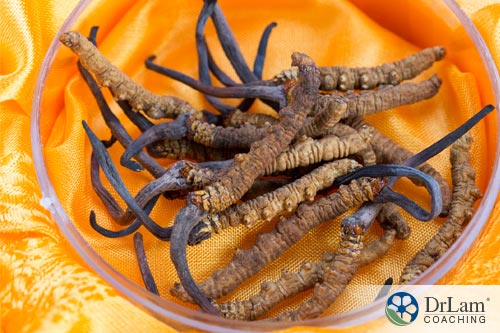 Cordyceps is a parasitic fungus from China. It is believed to stimulate your immune system and may be effective against certain types of cancers as it is rich in vitamins (especially B1, B2, B12, E, and K), fatty acids, sterols, proteins, essential amino acids, and nucleosides (uracil, guanidine, adenosine, hypoxanthine, thymine, and more).
Cordyceps is a parasitic fungus from China. It is believed to stimulate your immune system and may be effective against certain types of cancers as it is rich in vitamins (especially B1, B2, B12, E, and K), fatty acids, sterols, proteins, essential amino acids, and nucleosides (uracil, guanidine, adenosine, hypoxanthine, thymine, and more).
Cordyceps may provide relief when suffering from, amongst others, high cholesterol, irregular heartbeat, low libido in men, dizziness, fatigue, liver problems, and much more. It may also help fight certain types of cancer.
Those with autoimmune conditions should take care when taking cordyceps, as it may cause your immune system to become too active. It may also slow blood clotting, making it unsuitable for those with bleeding disorders.
Colostrum is the first breast milk produced by lactating animals (and humans) after giving birth. It is full of antibodies as well as immunoglobins which are essential for the immune system, helping to protect the newborn against viruses and bacteria.
Taken as a supplement, colostrum may help normalize the immune system, while it is easily digestible.
Colostrum is rich in:
The ingredients in colostrum are a key to longevity that are effective against conditions such as Chronic Fatigue Syndrome, autoimmune diseases (such as lupus, allergies, MS, and rheumatoid arthritis), reducing insulin resistance, and balancing blood sugar levels.
Although this product has no known side-effects, it is always best to use supplements under the guidance of a trained professional.
An Ayurvedic herb that may help manage a number of health conditions. It is said to improve your energy levels, help reduce stress, and help to enhance your immune system.
Research suggests this herb increases your attention span and improves your memory. Furthermore, it is said to fight depression while increasing your libido and enhancing your immune system.
Studies suggest that this herb aids in increasing your body’s T-cells, thereby strengthening the immune system. It may also help to combat stress and fatigue, boosting your energy levels. Siberian ginseng is also said to be great for relief of colds and flu, enhancing your physical performance, and improving your mental performance.
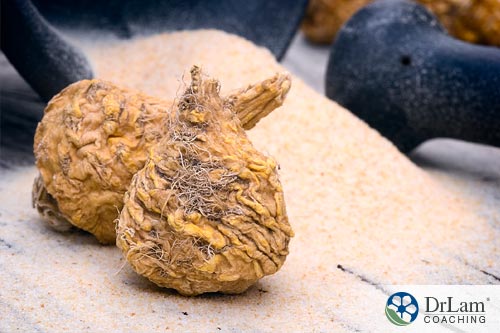 The root aids in balancing the hormones because of its specific nutrients, i.e. essential fatty acids, vitamin A, vitamin B12, calcium, and phosphorus. These nutrients are extremely beneficial for the endocrine system, which includes the pineal gland, pituitary gland, thyroid gland, parathyroid gland, pancreas, adrenal glands, and ovaries/testes. This system houses the glands that are responsible for hormone production, the most important part being the hypothalamic-pituitary-adrenal (HPA) axis that is the hormone regulation center of the body.
The root aids in balancing the hormones because of its specific nutrients, i.e. essential fatty acids, vitamin A, vitamin B12, calcium, and phosphorus. These nutrients are extremely beneficial for the endocrine system, which includes the pineal gland, pituitary gland, thyroid gland, parathyroid gland, pancreas, adrenal glands, and ovaries/testes. This system houses the glands that are responsible for hormone production, the most important part being the hypothalamic-pituitary-adrenal (HPA) axis that is the hormone regulation center of the body.
Stinging nettle provides the body with tons of energy and improves your iron levels. It contains an enormous variety of vitamins and minerals and is believed to be a great key to longevity that helps with stress.
Astragalus, an adaptogen, helps with warding off both physical or psychological stress. Due to the presence of antioxidants and its antibacterial and anti-inflammatory action, the herb is frequently used in fighting colds and upper respiratory tract infections as well as low blood pressure. The herb may also help strengthen your immune system in the event of chemotherapy, while certain studies suggest it may reduce your chances of contracting HIV/AIDS and cancer.
This key to longevity is a fruit that has been used by women to stimulate the production of milk and to ease menstrual problems. Research shows that the herb may help ease the symptoms associated with PMS, such as constipation, depression, headaches, and breast pain and tenderness.
It is believed chasteberry has an effect similar to progesterone which has an impact on the pituitary gland, resulting in increased testosterone production. It also has a beneficial effect on metabolic regulation, the pancreas, and the immune system.
Herbs and their counterparts may provide great relief to those with a hormonal imbalance, helping you to manage your condition and improve your health. By understanding the endocrine system and how each body function connects to another, using certain herbs can most certainly help manage the problem.
However, as with medications, herbs also have potential side effects; dosages should be well thought out and preferably prescribed by a qualified healthcare practitioner. As hormone imbalance and a weakened immune system could have so many different variables, each differing from one person to another, one should rather strive to find the root cause of the condition and structure supplementation in such a way as to address that instead of the condition in its entirety.
Additionally, what works for one person does not necessarily work for another, as each person is different and their body may react to the supplement of choice in a totally different fashion. Those with weak adrenals or suffering from Adrenal Fatigue Syndrome (AFS) need to be especially careful as many herbs can be stimulatory in nature and trigger adrenal crashes.
 Studies confirm that your attitude definitely contributes towards reaching a ripe old age. Those who have a positive outlook seemingly live longer and are more resilient and healthy overall.
Studies confirm that your attitude definitely contributes towards reaching a ripe old age. Those who have a positive outlook seemingly live longer and are more resilient and healthy overall.
It seems that to be positive boosts your antibodies, resulting in a stronger immune system. These people also tend to deal with stress easier, are less likely to develop heart disease, and do not show the same mental decline as their less positive counterparts.
There are six key to longevity factors. They are:
The autonomic nervous system regulates the different processes in your body automatically. This includes your internal organs, glands, blood vessels, and intestines. This means that, if for some reason, there is a dysfunction at a particular point in this system, all other aspects of the system is affected.
The thyroid gland is responsible for the production of hormones that regulate your heart, metabolic rate, bone maintenance, digestion, brain development, and muscle control. When thyroid function is compromised, it thus leads to a range of symptoms that could, ultimately, result in death.
Your liver is your body’s detox machine. Its role is to cleanse the body of toxins in order to maintain a healthy homeostasis. It is also important for metabolizing fat cells and breaking down damaged blood vessels.
If your blood sugar levels are too high, you might very well end up with a damaged pancreas, insulin insufficiency, and of course, diabetes. Additionally, hyperglycemia causes damage to blood vessels, thereby increasing the risk of heart problems, stroke, and developing problems with your eyesight or nerve conditions.
The adrenal glands are responsible for coping with stress. This stress can be psychological, physiological, or environmental in its nature. Too much stress could put a strain on the adrenal glands, resulting in a myriad health of problems, such as a hormonal imbalance, anxiety, depression, weight gain or weight loss, brain fog, loss of memory, diabetes, and a host of others.
The male and female sex organs are referred to as the gonads. The ovaries, in females, are mainly responsible for the production of estrogen, while in males, the testes produce testosterone.
Gonad health is important. Besides resulting in infertility and a loss of sex drive, compromised gonads may also result in too little male or females hormones being produced resulting in a hormonal imbalance with its own set of complications.
Common diseases resulting from a dysfunction in these six key factors include:
(and the list goes on)
The body’s automatic response system, i.e. the autonomic nervous system, is divided into two distinct parts. These are the sympathetic nervous system, and the parasympathetic nervous system. The key to longevity of the sympathetic nervous system is to control the body during emergency situations, In so doing, your heart rate increases, your muscles are ready to spring into action (to either fight or flee), and stored energy is released to ready you for the upcoming battle or your bid to run for safety.
The parasympathetic nervous system, on the other hand, tends to take over when conditions are ‘normal’. It decreases your heart rate and stimulates normal body functioning, e.g. the digestive tract, to work properly. It also makes sure energy is stored so that it can be used to build muscle.
The entire autonomic nervous system is responsible for sexual function.
 The hypothalamus in the brain could be likened to a command center. When it perceives stress, it communicates the danger signal via the sympathetic nervous system. This it does by sending chemical messengers to the pituitary gland which in turn stimulates the adrenal glands to increase its cortisol production, the body’s fight or flight hormone. These glands, i.e. hypothalamus, pituitary, and adrenals, are collectively referred to as the hypothalamic-pituitary-adrenal (HPA) axis and is part of the body’s key to longevity.
The hypothalamus in the brain could be likened to a command center. When it perceives stress, it communicates the danger signal via the sympathetic nervous system. This it does by sending chemical messengers to the pituitary gland which in turn stimulates the adrenal glands to increase its cortisol production, the body’s fight or flight hormone. These glands, i.e. hypothalamus, pituitary, and adrenals, are collectively referred to as the hypothalamic-pituitary-adrenal (HPA) axis and is part of the body’s key to longevity.
Please note that this response to stress is automatic, and part of the NeuroEndoMetabolic stress response.
The increased cortisol production serves to make the body aware of the danger and readies it to take action. During this process, other metabolic functions that are not considered essential to life are either stopped or decreased until such time as the situation passes. All functions then return to normal.
Constant stress, on the other hand, leads to a constant or increasingly heightened production of cortisol. This implies that the bodily functions that are compromised, stay that way. This could have a negative impact on all aspects of bodily function. It also has a potentially negative impact on the adrenal glands themselves.
As the adrenals become overworked, other organs need to help maintain cortisol production until such time as the adrenals become totally exhausted - resulting in adrenal fatigue. AFS has a devastating effect on your health with a wide range of symptoms.
These include, for example:
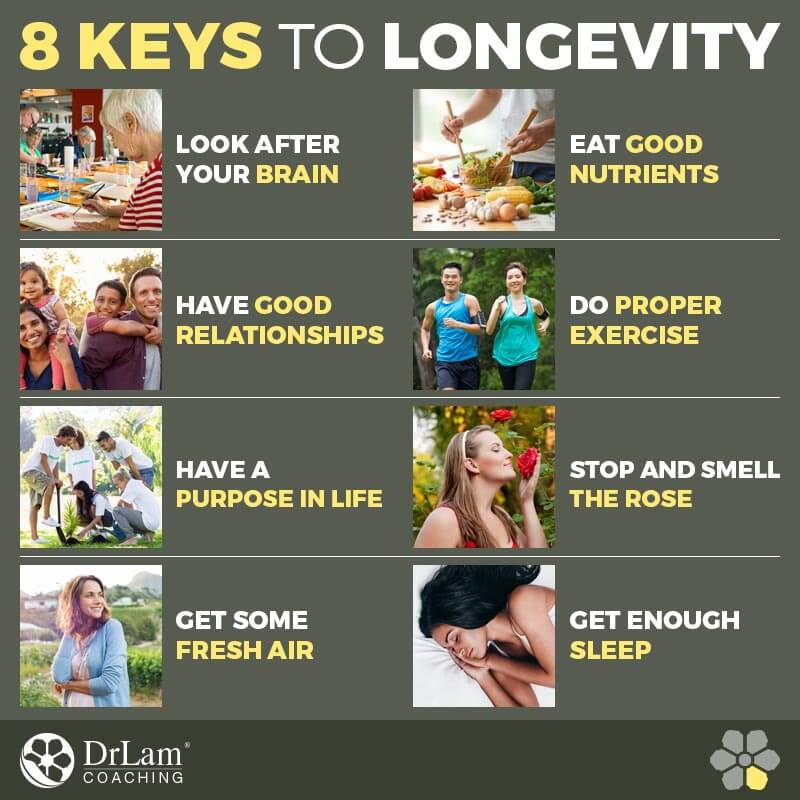
Cortisol plays a role in elevating blood sugar levels. The heightened cortisol production and accompanying flight or fight response, sees the body releasing more of its energy reserves in the form of glucose. Heightened blood sugar levels mean the pancreas constantly has to produce more and more insulin, until such time as the body becomes insulin resistant, a condition that can develop into diabetes.
Research indicates that these constant insulin surges have a devastating effect on the thyroid gland, resulting in a reduction in production of thyroid gland hormone. Symptoms commonly seen in such incidences include high blood pressure, the formation of blood clots, high levels of (bad) cholesterol, obesity, etc.
Adrenal fatigue also has a devastating effect on your gut health and immune system.
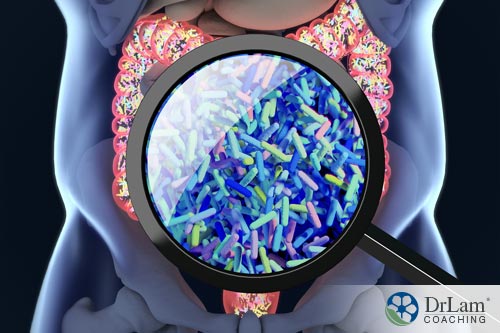 The gut houses the majority of your body’s immune tissues. The main function of the immune tissue is the production of antibodies that attack foreign invaders, keeping you and your gut healthy. If, however, your gut health is compromised, the gut lining is weakened.
The gut houses the majority of your body’s immune tissues. The main function of the immune tissue is the production of antibodies that attack foreign invaders, keeping you and your gut healthy. If, however, your gut health is compromised, the gut lining is weakened.
Foreign matter is then able to access your blood through your gut lining, spreading disease. You end up with what is termed leaky gut syndrome or intestinal permeability.
The gut itself is full of parasites, which we commonly refer to as bacteria. As mentioned previously, there are different types of bacteria. The ‘good’ bacteria is usually the key to longevity that is in the majority. They have a positive function in the digestive process but also help with the transformation of T4 (inactive) thyroid hormone into the active T3 version. However, when gut health is compromised, this conversion is suppressed, thereby compromising thyroid function.
One of the side effects of continued stress is that liver function slows down. The main function of the liver is the production of bile to digest fats and to remove toxins which are eliminated via stools. Prolonged stress, however, slows down liver function, making it sluggish. The result is a buildup of toxins in this organ and the gallbladder not being emptied of the bile stored there. The result, in the gallbladder, is often the formation of gallstones.
Constant cortisol production, and thus, by definition, adrenal fatigue, also has certain consequences for the gonads. The precursor hormone to the sex hormones, as well as cortisol, is pregnenolone. This hormone is primarily produced in the adrenals from cholesterol. It is, however, also manufactured in the gonads, i.e. testicles and ovaries, the retina of your eyes, your brain, skin, and liver.
As mentioned, when stressed, the adrenals tend to produce more cortisol, thus using up pregnenolone reserves, and when adrenal fatigue sets in, other avenues ensure its production – including the sex organs. The result is a decrease in the production of sex hormones in both men and women, as the body favors cortisol production for survival purposes. Procreation is not deemed essential for your personal survival.
Studies conducted on the parasites present in the human body has come up with a number of interesting results and hypothesis. What it has found, is that for all of the following conditions, and more, there is a possible parasitic link:
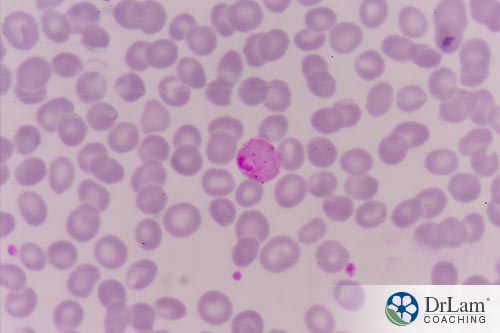
Many of these conditions have links to adrenal fatigue. This begs the question: is there a possible link between the occurrence of these parasites and adrenal fatigue? Are they a key to longevity?
Researchers have identified over a million different parasites in the human body and are identifying more each day. These parasites are present throughout the body, including the skin, blood, and gut. We walk around with these parasites our entire lives. Many are beneficial and play an important role in, for example, optimal gut function. Others, however, may prove potentially deadly.
One of the biggest problems concerning these parasites, or microbes if you will, is that they are constantly evolving. They change. Their functions change and in so doing they have the potential to have a profound effect on our general health and wellbeing.
It is proven that these parasites play an important role in digestion, but they play an important role in other bodily functions as well, such as the brain, as we have mentioned. However, it is when these parasites become destructive that we tend to encounter a vast number of systems and diseases that are a direct threat to our lifespan.
Besides taking measures to ensure these parasites stay in a state of homeostasis, i.e. that the ‘bad’ ones do not proliferate to such a degree that they overtake the ‘good’ ones, what can we do to ensure we do not age before our time?
In other words, what are the keys to longevity?
The starting point is to look after your brain. This means keeping it occupied, learning, taking an interest in things, learn to manage stress, and see to it that it gets the nutrients it needs.
Good nutrition is vital. Your body needs certain essential nutrients in order to function properly. This is not only necessary for bone and muscle health but the health of the adrenals and gut as well. Good nutrients help ensure a strong immune system in order to fight off ‘bad’ parasites, and immunity starts in the gut.
 Mental health hinges, to a large degree, on your relationships. If your relationships with friends and family are great, the chances are you are happy as a person. Happiness reduces stress, while good relationships give you a solid support system.
Mental health hinges, to a large degree, on your relationships. If your relationships with friends and family are great, the chances are you are happy as a person. Happiness reduces stress, while good relationships give you a solid support system.
Regular moderate exercise is great for the muscles, bones, and mental health, as the endorphins released fight the signs of stress while making you feel good.
Having a purpose in life keeps you active and the mind working. It does not matter whether the purpose is volunteering at a dog shelter for a few days a week or working in a soup kitchen. Caring for other living things stops you from concentrating on your own problems and reduces your stress and improves your general health as well.
Taking time out to just be still is an important key to longevity. In a sense, being still equates to meditating, as it is a time to ponder, reflect, and get things into perspective.
Being out in nature is a wonderful way to wind down. It also ensures you get some sun exposure and a supply of vitamin D which is necessary for adrenal health.
Your body heals itself when you sleep. It is, therefore, logical to conclude that when you do not get enough sleep, the body is not able to restore itself. Simple, isn’t it?
Research clearly suggests there may be a strong correlation between parasites and our health. Although we may wish to rid ourselves of any and all parasitic infestations, we need to remember that not all parasites are ‘bad’. Indeed, many are necessary for our continued health and could be deemed as some of the key to longevity.
The challenge, therefore, is to rather take measures to ensure our bodies are healthy, can meet the challenges it faces every day, and that we build up a strong immune system in the process.
Yes, it is, in a sense. Proper adrenal function is to a large extent responsible for dysbiosis in the body, resulting in an imbalance between good and bad bacteria. Healthy adrenal glands, however, encourages homeostasis, implying a balance between these necessary microbes and a healthy immune system.